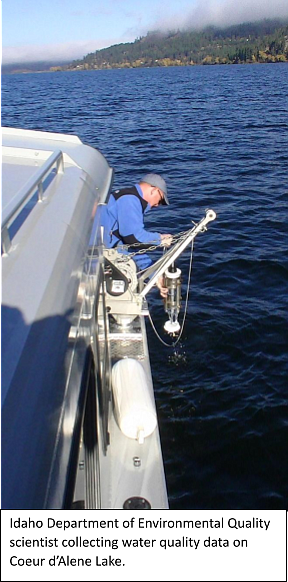Our Gem: Scientific Review of Coeur d’Alene Lake Water Quality Data to Begin this Month
What IS the future of Our Gem Coeur d’Alene Lake’s water quality? That is the question on the minds of many in northern Idaho, including state and tribal governments tasked with monitoring and improving water quality, elected officials with jurisdiction on the Lake, shoreline property owners, the local tourism industry, and many concerned citizens. Why? Historical mining activities deposited millions of tons of contaminated and potentially toxic sediment including zinc, cadmium, and lead into Coeur d’Alene Lake and its tributaries. Since the implementation of environmental regulations in the mid-1970s, metal concentrations have declined, but lakeshore development, increased recreational and boating use, land use changes, and increased nutrient loads could reverse this success.
In 2018, the Coeur d’Alene Tribe questioned whether the Coeur d’Alene Lake Management Plan was enough to protect the future of Coeur d’Alene Lake. In 2020, in response to a recommendation of Governor Little, the Idaho Department of Environmental Quality (IDEQ), Kootenai County, and the US Environmental Protection Agency, with support of the Coeur d’Alene Tribe, asked the National Academy of Sciences (NAS) to undertake a comprehensive analysis of water quality data in Coeur d’Alene Lake and provide recommendations to address issues of concern.
The NAS Committee includes experts in many related disciplines from across the country. This distinguished Committee will evaluate the quality of data that has been collected by IDEQ, the Coeur d’Alene Tribe and other highly reputable sources. The Committee will address the ability of experts to effectively interpret, model from, and act on data collected. They will also make recommendations for collecting additional data that may be needed.
The NAS Committee will host two public meetings on the Future of Water Quality in Coeur d’Alene Lake later this month to begin a systematic process addressing the quality and recommendations for Coeur d’Alene Lake water quality data. In addition to these public meetings, the Committee will hold two member-only meetings.
The public meetings will take place virtually and will include open sessions with presentations on available data from study sponsors and an open-mic period to hear stakeholder comments at the end of the first session. There may also be an open mic period at the end of the second open session if needed. The Committee, sponsor stakeholders and the Our Gem Collaborative strongly encourage the public to attend these open meetings.
The first session is scheduled for Feb. 24 from 8 a.m. to noon PST and will include introductory and background information related to the Coeur d’Alene Basin as well as an explanation of the goals of the study. The second session is scheduled for Feb. 26 from 8 to 11 a.m. PST and will be more technical in nature, covering previous data collection, analyses, and modeling efforts.
The NAS Committee is convened to take a rigorous scientific approach to complex questions related to lake water quality, summertime oxygen deficiencies in lake bottom waters, the impacts of zinc levels in water on algal growth, the fate of metals found in lakebed sediments, and the relevance of metals release from sediments to human and ecological health. The series of meetings, Committee deliberations, and related analyses will culminate in a final report in the summer of 2022.
The open mic sessions at the first public meetings on Feb. 24 and 26 will be an opportunity for public input to the Committee as they initiate their investigation into the current and potential future status of Coeur d’Alene Lake water quality. The public is invited to provide input to the NAS throughout the process. Details for meeting access and more information from the National Academies can be found at https://www.nationalacademies.org/our-work/the-future-of-water-quality-in-coeur-dalene-lake.
For more information visit the Our Gem Collaborative website (www.uidaho.edu/OurGem) or contact Jamie Brunner, Coeur d’Alene Lake Management Supervisor, Idaho Department of Environmental Quality, Jamie.brunner@deq.idaho.gov, 208-946-0174.
The Our Gem Coeur d’Alene Lake Collaborative is a team of committed and passionate professionals working to preserve lake health and protect water quality by promoting community awareness of local water resources through education, outreach and stewardship. Our Gem includes local experts from the University of Idaho Community Water Resource Center, Coeur d’Alene Tribe Lake Management Department, Idaho Department of Environmental Quality, Kootenai Environmental Alliance, Kootenai County, Coeur d’Alene Regional Chamber and CDA 2030.

